The Great Repression
Ruth Green, IBA Multimedia JournalistMonday 18 March 2024
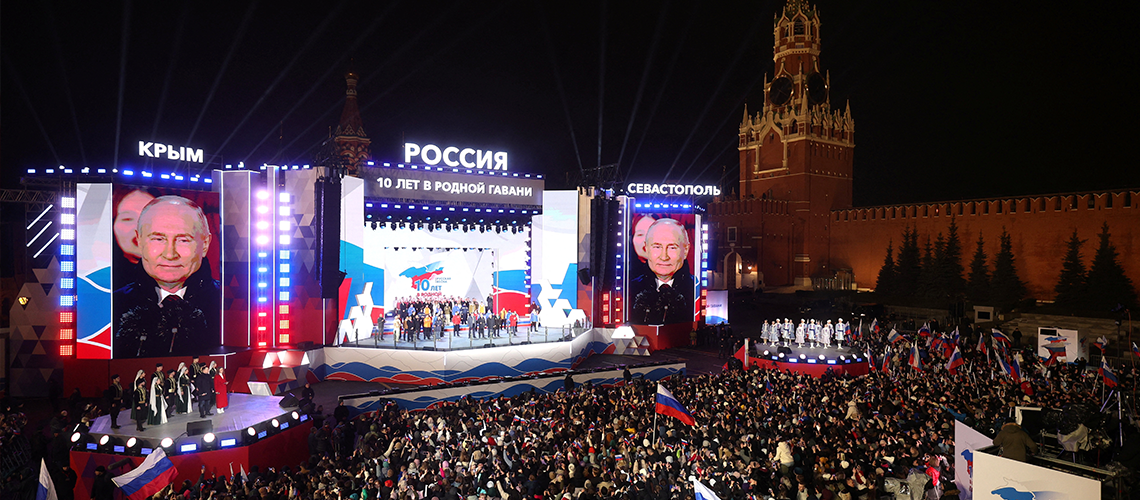
Russian President Vladimir Putin, seen on screens on the stage as he attends a rally, which marks the 10th anniversary of Russia's annexation of Crimea from Ukraine, in Red Square in central Moscow, Russia, 18 March 2024. Sputnik/Gavriil Grigorov/Kremlin via REUTERS
As President Vladimir Putin is re-elected for a fifth term, Global Insight examines what’s kept him in power and what the vote means for the rule of law, and for Ukraine.
It was, for all intents and purposes, a foregone conclusion. But even in this pivotal year for elections, there’s no danger of this Russian presidential election being consigned to the history books.
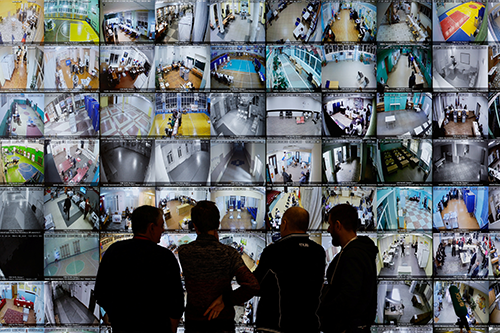
Screens show views from polling stations on the final day of the presidential election in Moscow, Russia, 17 March 2024. REUTERS/Shamil Zhumatov
The vote, which took place on 15–17 March, saw President Vladimir Putin re-elected with a landslide victory for a fifth term in office, marking the country’s first presidential election since it launched a full-scale war in Ukraine. The war has developed into the largest interstate conflict seen so far this century and has become a symbol for the global struggle between democracy and autocracy.
At home, in Russia, it’s a different story. Putin even used his recent state-of-the-nation address to reassert the importance of the country’s ‘special military operation’ in Ukraine and hailed Russia as a ‘pillar of democracy’.
Putin, a former KGB officer, was first appointed as prime minister under Boris Yeltsin in August 1999. Yeltsin’s sudden resignation on 31 December pushed him into the limelight as acting president and he was officially elected as president in March 2000. Putin’s grip on power since has been unremitting, including a brief stint as prime minister from 2008–12 when constitutional term limits required him to stand down as president.
On his re-election for a fourth term in 2018, by law he would’ve been required to step down in March 2024. However, this changed in 2021 when he brazenly amended the constitution to allow him to run for not just one, but two further consecutive presidential terms. Greater powers were also granted to parliament and its advisory body, the State Council, which he still chairs today.
As Russia enters its third year of war in Ukraine, Putin is only the third sitting head of state ever to be indicted by the International Criminal Court. Despite this, his victory in the election was assured: more than two decades of repressive laws designed to silence dissent and create a climate of fear had all but eradicated any form of meaningful political opposition in Russia.
Eliminating opposition
The killing of Yevgeny Prigozhin, former leader of the Wagner Group, in August 2023 and the death of imprisoned Russian opposition leader Alexei Navalny in February this year eliminated two of Putin’s most dangerous opponents.
The country’s Central Election Commission (CEC) originally barred Navalny from running in the 2018 presidential election for charges that he claimed were politically motivated. In 2021, a Moscow court ruling declared his Anti-Corruption Foundation (FBK) ‘extremist’, making it impossible for the Kremlin critic to stand in elections without severe consequences.
This procedure cannot be called an election and cannot be seen as a legitimate process
Evgenia Kara-Murza
Wife of political activist Vladimir Kara-Murza
Despite this, Navalny’s recent death in prison suggests Putin still felt threatened by him even from behind bars, says Mark Stephens CBE, Co-Chair of the IBA Human Rights Institute and a partner at Howard Kennedy in London. ‘Even though he was in isolation at a remote Arctic penal colony, he was still considered a sufficient threat to Putin’, he says. ‘That shows a level of vulnerability on Putin's part.’
Dissent also poses a threat to Putin even in exile. In the days running up to the election, Leonid Volkov, Navalny’s former chief of staff, reported that he’d been attacked outside his home in Lithuania. Lithuania’s state security department said in a statement that it had gained intelligence to suggest this was a ‘Russian-organised and implemented operation’ designed to prevent ‘the Russian opposition’s projects in connection with the forthcoming undemocratic Russian presidential elections’.
Domestic public support for Putin appears to have grown steadily since Russia’s invasion of Ukraine. Censorship, propaganda and a remarkably resilient economy in the face of international sanctions have all contributed to Putin’s infallible image of stability. A February poll by the independent Levada Center found his approval rating had rebounded to 86 per cent.
However, in October, a survey by polling agency Russian Field revealed for the first time that the proportion of Russians who wanted the war in Ukraine to end was greater than the number who supported its continuation.
The sample – just 1,200 individuals – was small, but indicative of growing domestic unease with Putin’s military goals in Ukraine. It also highlights why the Kremlin went to such great lengths to push back at anti-war rhetoric ahead of the election.
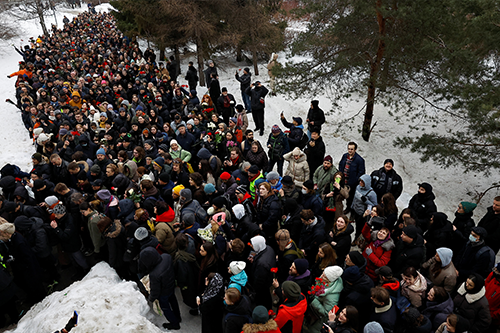
People walk towards the Borisovskoye cemetery during the funeral of Alexei Navalny in Moscow, Russia, 1 March 2024. REUTERS/Stringer
At the end of February, Oleg Orlov, one of Russia’s most prominent human rights defenders, was sentenced to two-and-a-half years in prison on politically motivated charges of ‘discrediting’ Russia’s armed forces. Orlov, who co-chairs Russia’s oldest human rights group, Memorial, was fined in 2023 for the same charges, but prosecutors argued his punishment had been too lenient and demanded a retrial.
Grigory Vaypan, a senior lawyer at Memorial, described the verdict as ‘harsh and shameful’ and said it pointed to the authorities’ increasingly repressive methods to silence critics of the war. ‘Oleg Orlov has been convicted solely for peaceful expression of his opinion and his criticism of Russia’s brutal war of aggression against Ukraine’, he told Global Insight. ‘[He] is a courageous civil society leader who was not afraid to speak truth to power. Recent Russian laws that censor anti-war speech are manifestly contrary to international law and must be repealed.’
One of Putin’s leading political rivals, Vladimir Kara-Murza, remains in prison, also on charges of discrediting the armed forces. His wife, Evgenia Kara-Murza, told Global Insight that the election would be a ‘sham’ from start to finish. ‘This procedure cannot be called an election and cannot be seen as a legitimate process considering the fact that it will take place in the occupied Ukrainian territories where people are forced to accept Russian citizenship in exchange for humanitarian aid’, she says. ‘People are [being] coerced to become Russian citizens in exchange for medicine. And no results can be seen as legitimate in such a process.’
Officially, this year’s presidential election was not a one-horse race, but the government’s increasingly draconian crackdown on critics of Russia’s conduct in Ukraine ensured that anti-war candidates didn’t stand a chance of making it onto the ballot paper for this election.
In December, the CEC banned former journalist and vocal war critic Yekaterina Duntsova for alleged ‘errors’ in her registration documents. In February, the remaining anti-war candidate, who had been tipped as the only vaguely credible opponent to rival Putin, was barred for alleged ‘irregularities’ in the collection of signatures supporting his candidacy.
Russia’s Supreme Court upheld both of the CEC’s decisions. Apart from Putin, just three other politicians remained on the official candidate list: Leonid Slutsky of the Liberal Democratic Party, Nikolai Kharitonov of the Communist Party and Vladislav Davankov of the New People party. None were expected to pose a serious challenge to Putin.
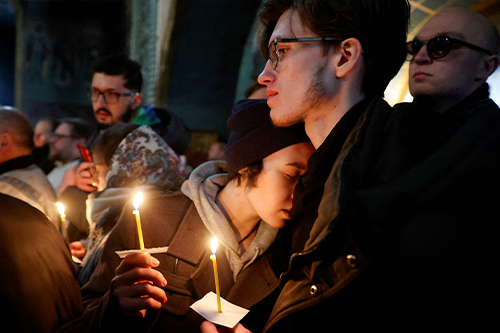
Mourners attend a funeral service and a farewell ceremony for Alexei Navalny in Moscow, Russia, 1 March 2024. REUTERS/Stringer
As the election approached, it became clear that the type of ‘castling swap’ that saw former Prime Minister Dmitry Medvedev elected for a token single term from 2008–12 was not part of Putin’s playbook this time.
Nor was it for Putin to take a backseat from politics, says Bota Iliyas, an analyst at Control Risks. ‘Observers have been wondering whether Putin would choose to install a loyal successor and rule from the shadows, a la Nursultan Nazarbayev’, she says.
Nazarbayev ruled Kazakhstan with an iron fist from 1990 until 2019 when he installed his hand-picked successor President Kassym-Jomart Tokayev. Much like Putin, Nazarbayev’s allies control a large proportion of the oil-rich nation’s economy and he remained chair of the country’s Security Council until he was ousted by Tokayev in early 2022 following nationwide unrest. He has maintained a low public profile ever since, but was reported to have held talks with Putin in December.
In December, Putin announced he was standing again in the 2024 presidential election, making his intentions clear. Despite running virtually unopposed, Iliyas says the regime was still easily rattled in the run-up to the election. ‘The images of mountains of flowers at Navalny’s grave a little over a month before the election undermined the veneer of stability and public support for Putin that the Kremlin is so keen to portray’, she says.
Angela Stent, a senior non-resident fellow at the Brookings Institution, says it’s striking how many people came out publicly in support of Navalny, knowing the risks of prosecution and even imprisonment, at a time when the Kremlin has been so keen to showcase Putin’s legitimacy and double down on repression.
‘It wasn't a huge number of people, but it was in the tens of thousands’, Stent says. ‘That was probably also for the Kremlin to try and figure out how many people would come out and protest – how many people would publicly show that they're against the war. I think we had a demonstration of that. Unfortunately, that doesn't necessarily mean that that's going to continue. But at that moment, it was a snapshot of people of all ages coming out and saying “We want a different Russia.”’
Electoral manipulations
Allegations of vote-rigging and intimidation tactics to boost turnout have long been a feature of Russian elections. This vote looked to be no different, but Iliyas said the use of repression, coercion and manipulation tactics had reached ‘unprecedented levels even for Putin’s Russia’ this time around.
Two new elements also made this election process more susceptible to fraud. For the first time, the vote for the president took place over three days instead of one. Three-day voting periods were introduced in Russia during the pandemic to minimise the spread of the virus. They were used in the 2021 parliamentary elections in which Putin’s United Russia party won almost 50 per cent of the vote. However, the results were widely condemned over allegations of fraud, ballot box stuffing and threats against election observers.
We do not recognise those elections conducted on the occupied territories – they are illegal
Iryna Mudra
Deputy Justice Minister of Ukraine
It was also the first time that electronic voting was used in a presidential election. E-voting was rolled out to 27 Russian regions, plus Crimea, which was annexed by Russia in 2014, despite concerns from international observers that the system could make it even easier for the results to be manipulated.
They had a point. E-voting is still in its infancy in Russia and has a poor track record. It was deployed across six regions in the 2021 parliamentary elections, but was widely criticised by Russia’s Communist Party, which alleged widespread vote-rigging after the e-votes appeared to reverse the party’s substantial lead. The CEC denied allegations of any violations.
For a country where the risks of vote-rigging and interference are already sky-high and repressive tactics are regularly used to pressure voters, these new elements raised the stakes even higher for potential electoral fraud.
The relentless efforts by the authorities to remove any oversight, either local or international, also dented any hope of a free and fair election. Last August local monitoring group Golos accused the Russian authorities of trying to block scrutiny of regional elections after police raided the homes of a dozen of its members and detained its chair, Grigoriy Melkonyants, over charges of cooperating with an ‘undesirable organisation’, which he denies.
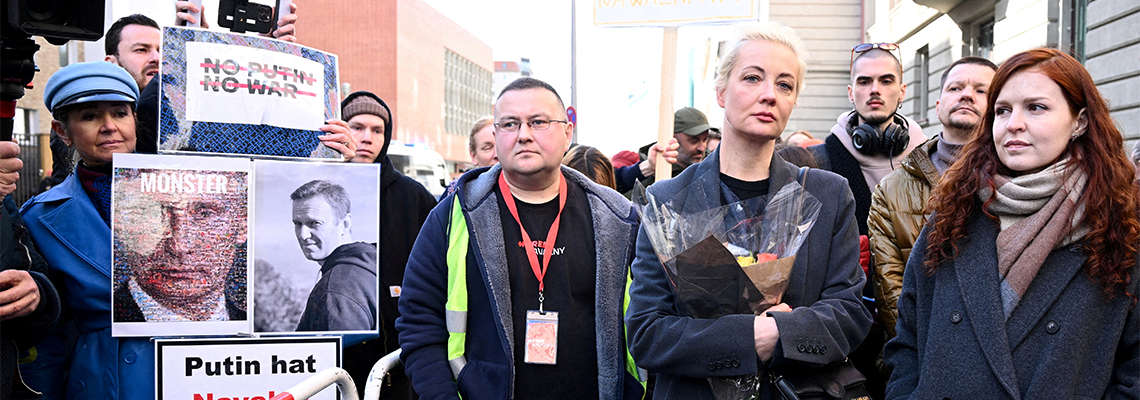
Yulia Navalnaya, the widow of Alexei Navalny, and her spokeswoman Kira Yarmysh stand in a queue outside the Russian Embassy on the final day of the presidential election in Russia, in Berlin, Germany, 17 March 2024. REUTERS/Annegret Hilse
In December, a Moscow Court ruled that Melkonyants’ pre-trial detention should be extended by a further three months until mid-April – a month after the presidential election would be taking place.
There were no international observers present over the election period either. The OSCE’s Office for Democratic Institutions and Human Rights (ODIHR) issued a statement in January saying the CEC had not extended an invitation for its observers to monitor the election. This marks the second consecutive time that the ODIHR has not deployed observers to national-level Russian elections.
Voting for the Russian president also took place in occupied parts of Ukraine's Donetsk, Luhansk, Kherson and Zaporizhzhia regions. There were reports early on of officials accompanied by Russian soldiers going house to house with ballot boxes looking for voters.
Commenting on the legitimacy of the Russian election, Ukraine’s Deputy Justice Minister, Iryna Mudra, told Global Insight: ‘We do not recognise those elections conducted on the occupied territories – they are illegal. Neither Ukraine nor the democratic world will recognise the results of these elections on the territory of Ukraine which is under occupation.’
Ukraine was due to hold its own presidential election at the end of March 2024, but in accordance with its constitution the country cannot host elections during wartime while it is under martial law (See box: Ukraine’s democratic dilemma).
Putin the inevitable
Despite waning support for the war inside Russia and the degree of outrage following Navalny’s death, Putin’s re-election seemed inevitable. Protests, ballot spoiling and arrests kicked off the weekend of voting, but by the evening of 17 March Putin had already claimed a landslide victory. Election officials gave him 87 per cent of the vote with a 77 per cent turnout – the highest ever result and turnout in post-Soviet history. Foreign governments denounced the election as rigged from the outset.
The result secures his presidency until 2030, making him Russia’s longest serving leader since Soviet dictator Joseph Stalin. The result does bring the Russian electorate the stability it continues to crave. However, huge questions remain.
It’s unclear, firstly, whether Russia will embark upon another mass mobilisation to make up for heavy losses in Ukraine, and secondly, if this would result in another mass exodus or more protests. If the pre-election levels of repression continue – and most international experts believe they will – the prospect of any significant level of protest or revolt in Russia seems altogether implausible.
The result also provides clarity for global powers that this recidivist leader has no intention of leaving the Kremlin anytime soon. ‘With the election behind, global powers can expect Putin to remain in charge in the coming year or two, at least’, says Iliyas. ‘And Putin is very unlikely to change his position on Ukraine, which means the war will continue as he will seek to formalise control of Ukraine’s occupied regions in the east and south.’
It now looks increasingly likely that Putin could stay in power until 2036. If he does, he’ll become the second-longest serving president in Europe after Belarus’ Alexander Lukashenko – often labelled ‘Europe’s last dictator’ – who will celebrate 30 years of autocratic rule later this year. As the destruction and bloodshed continue in Ukraine, the prospect of another six or even 12 years of Putin’s Russia is a terrifying prospect.
Yulia Navalnaya, Navalny’s widow, is one of many influential voices that have called on the EU and other Western powers to refuse to recognise the election result.
The current regime is far beyond listening to any reasoning on the part of the democratic world
Irina Paliashvili
Founder, RULG-Ukrainian Legal Group
Public criticism is likely to fall on deaf ears though, says Irina Paliashvili, Secretary-Treasurer of the IBA Rule of Law Forum and Founder of the RULG-Ukrainian Legal Group. ‘There is no message that other countries can send to Russia that will change anything, the current regime is far beyond listening to any reasoning on the part of the democratic world’, she says.
As democracy faces huge challenges around the world, Stent fears the global response to Putin’s victory will be yet more silence. ‘Nobody's going to really criticise the election’, she says. ‘The Chinese certainly aren't. There are calls, of course, in Europe and in the United States, that the government shouldn't recognise his re-election. I think that would be difficult because most Western countries also deal with other countries where one can question the election results. I think the global reaction will be more silence, but particularly on the part of the West.’
Paliashvili says global leaders’ continued failure to stand up to Russia has given the Kremlin free rein to ride roughshod over the rule of law and Ukraine. ‘That gave Russia a sense of impunity and [the] green light to consistently undermine for almost two decades the international order and global rule of law, culminating in the full-scale war of aggression against Ukraine.’
Ukraine’s democratic dilemma
When Volodymyr Zelensky won Ukraine’s presidential election on the last Sunday in March in 2019 there was every expectation that he would be standing again for re-election exactly five years later.
The war changed everything. On 24 February 2022 the country introduced martial law following Russia’s full-scale invasion. Under the law, which has been extended several times, elections are not permitted to take place.
Some hardline US Republicans have used the issue as a political football to block US military aid to Ukraine, but President Zelensky has denounced calls for the country to host an election during conflict as 'irresponsible'.
There are many practical obstacles – from printing ballots, preparing polling stations to carrying out demining activities – which would make it extremely challenging for Ukrainians to vote safely during wartime.
It’s also unclear how the country could host a vote that meets the international standards for free and fair elections at a time when political campaigns cannot be conducted freely and so much of the electorate is either fighting on the frontline or has fled abroad.
Already vulnerable to digital threats, e-voting is not a practical solution either. Although the country has form in enabling the Ukrainian diaspora to vote in polling stations abroad, the huge number of Ukrainian voters – mostly women – now based overseas creates unique infrastructure and technical challenges for foreign governments as well.
A Kyiv-based constitutional law expert told Global Insight it’s vital that Ukraine is afforded the time to create a ‘politically competitive environment’ before any election takes place. The expert, who cannot be named for security reasons, says calls to override martial law and Ukraine’s electoral code to host an election now would also be inimical to the rule of law: ‘It's impossible to amend the election code and martial law legislation just to have an election in Ukraine. It would create really huge problems with trust in the results of the elections and the legitimacy of the elected persons.’
There has been growing reluctance from countries like Russia and Belarus to extend invitations to international election monitors, like the OSCE’s Office for Democratic Institutions and Human Rights (ODIHR), to observe recent national elections.
ODIHR has observed all previous national elections in Ukraine. Meaghan Fitzgerald, Head of ODIHR’s Election Department, says there’s a strong recognition that international observation missions will be vital to upholding and safeguarding democratic processes for any future presidential election held in the country. ‘We see, as do the Ukrainians, a very strong value in having observation of the first elections after the conflict or as soon as the elections are able to be conducted’, she says. ‘There is a great need for the world to see how they were conducted by an independent body that has the ability to cover Ukraine, which is a very large country. It’s a massive operation, even in, peaceful times.’
ODIHR has been assisting the country’s electoral authorities on a range of issues, including reviewing and recommending potential amendments to electoral laws and how to deal with the practical challenges of voter registration, both inside and outside the country.
Fitzgerald stresses that ODIHR is also working hard to prepare its own staff and observers ahead of any official invitation. ‘We know it will be a significant endeavour for ODIHR and one that it is quite unique and new for us in terms of true post-conflict or active conflict observation activity’, she says. ‘We are already speaking to our participating states and those that regularly second observers to our election observation missions because it will entail their support and their engagement well in advance to make sure that preparations are in place.’
Ruth Green is the IBA Multimedia Journalist and can be contacted at ruth.green@int-bar.org
